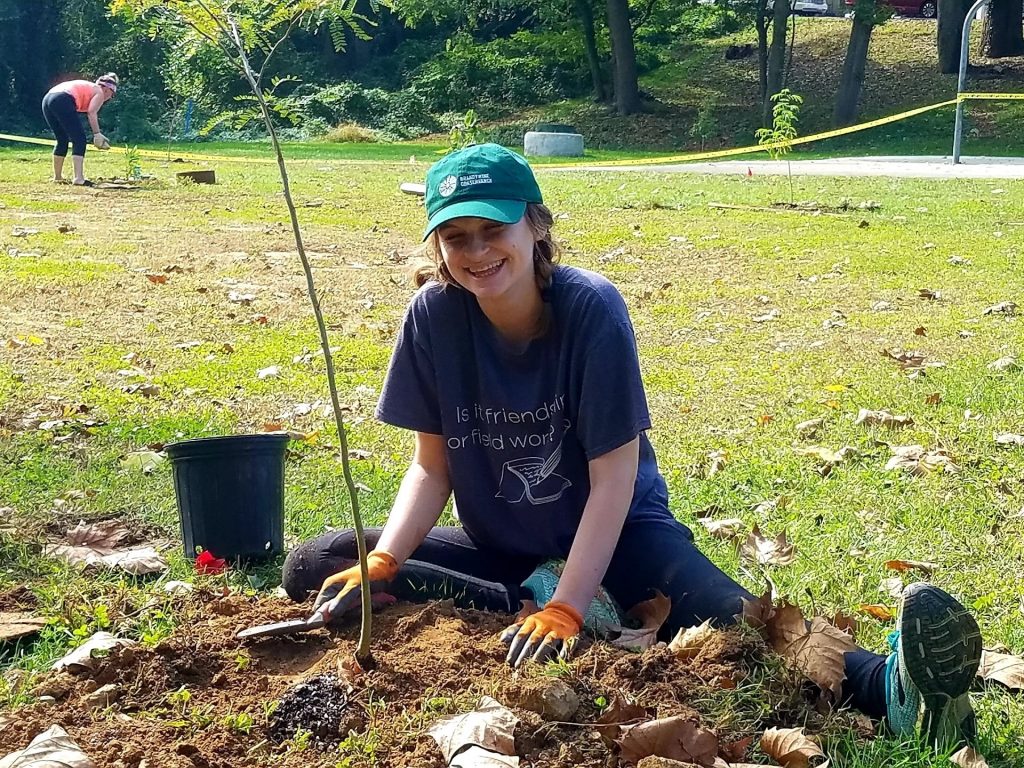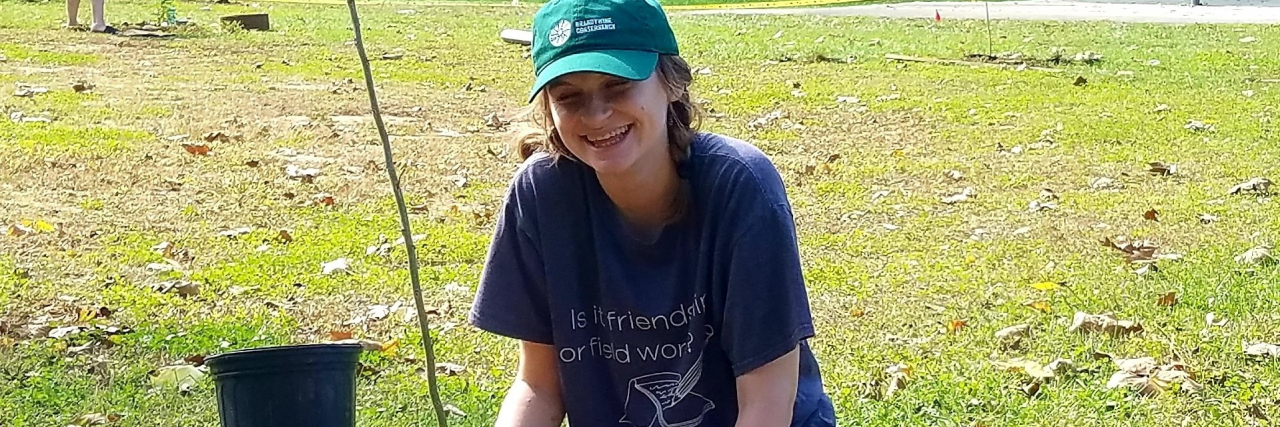World Health Day Reminds Us That Climate Justice, Climate Change, and Health Care Are All Connected
Editor's Note
If you experience suicidal thoughts, the following post could be potentially triggering. You can contact the Crisis Text Line by texting “START” to 741741.
During my most recent depressive episode, the looming threat of worsening climate change played a significant part in my suicidal spiral. I would fixate on the downstream effects that climate change has caused and will continue to cause, especially the effects on health (we are still in the midst of a pandemic , after all).
There’s even a word specifically used to describe climate change-induced distress: solastalgia, or the pain or devastation felt from losing one’s sense of place or home due to change over time that’s caused by something out of their control, such as ecological destruction. In the time of Twitter doomscrolling , I’m sure most, if not all, of us have experienced solastalgia at one point or another.
So, when I saw that the World Health Organization (WHO) theme for World Health Day 2022 is “our planet, our health,” my heart did start racing a bit.
At a time when there feels like a new divisive event occurs every day, World Health Day reminds us that the only way to improve our world and the health of its inhabitants is through cooperation, compassion, and systemic change.
What Is World Health Day, Exactly?
World Health Day is held on April 7th each year, to commemorate the founding of the WHO in 1948 , and to draw attention to a pressing health issue for a global audience. With this year’s topic, “our planet, our health,” the WHO is trying to focus global health efforts on improving both environmental and human well-being by demonstrating that “the climate crisis is also a health crisis.” In this urgent call to action, the WHO asks us to reimagine a world where health and well-being are prioritized in all sectors of society and resources, such as clean air and water, are available to all, regardless of geographical location or socioeconomic status. Isn’t this a wonderful future to work toward?
Why Ecological Destruction and Physical Health Are Linked
Every April 7, I think about how I can turn my anxious energy into productivity and advocacy for a more just, healthier world. Past themes for World Health Day have included “building a fairer, healthier world,” “health for all: everyone, everywhere,” and “vector-borne diseases.” Through my previous work and research in the field of medical anthropology – and through my journey with a delayed Lyme disease diagnosis – I’ve seen how climate change connects these themes firsthand.
Ecological destruction and change have already caused an increase in cases of Lyme disease in my region. Deforestation creates more habitats for the nymphal ticks that carry the bacterium that causes the illness and shorter, more temperate winters provide the ticks with more active days to infect hosts. Having experienced the horrific joint pain, fever, and painful treatment that go along with Lyme disease, I can personally confirm this is not an ideal outcome.
In addition to the physical consequences of global warming on the planet and our bodies, there is a significant correlation between climate change and psychological health.
Why Climate Change Can Also Cause Psychological Change
In a meta-analysis from the International Journal of Environmental Research and Public Health, an increase in temperature has been shown to be associated with an increase in mental health issues along with increased stress and the emotions that feed off it. Psychiatric services are more frequently utilized; I, for one, spent months in a psychiatric partial hospitalization program and then an intensive outpatient program during my recent depressive period.
I’m not the only one whose mental health has taken a downturn due to worrying about climate change and the lack of government and corporation response to global warming. In a study (which hasn’t been reviewed by others, yet, so may not hold up under scrutiny) led by researchers at the University of Bath and the Stanford Center for Innovation and Global Health, 45% of 10,000 respondents aged 16-25 surveyed said they experience anxiety over climate change that interferes with their daily lives. 64% said that politicians are not doing enough to combat the causes and effects of climate change, and they even went so far as to say that they feel unprotected by their governments.
These studies have also observed that anxiety and stress increase due to climate change-related events. This could be, in part, due to the isolation and loss one experiences after being forced to evacuate their home due to a natural disaster, or even the sense of isolation and abandonment we can experience when we feel like our voices aren’t being heard.
If the past two years have taught us anything, it’s that we are more social creatures than we probably want to admit. Mental and physical health conditions can also increase feelings of isolation and distance – whether perceived or actual – from those around us. And let’s not forget the folks who were either isolating or feeling lonely even before the COVID-19 pandemic and quarantine measures began.
If you’re anything like me, you only become more depressed from that loneliness, which makes you turn to your phone and the 24-hour news cycle and images of destruction from wildfires, natural disasters, and the ever-shrinking polar ice caps, thus continuing the horrible cycle.
Can We Make the World a Healthier Place Without the Eco-Ableism?
So what do we do about this? Environmental justice movements are notoriously ableist. I’m still arguing with people over the straw ban , after all. The term eco-ableism exists for a reason. Protests, marches, and lobbying aren’t exactly always accessible. We do have a voice in this movement that needs to be heard. 70% of the disabled community lives in the Global South , where the people and the countries least responsible for the damage to our planet are the ones who are forced to deal with the most devastating and direct effects.
How do we rise up in support of our community? It can take a lot of spoons to be an activist, but we’re a resourceful crowd with a lot of passion and knowledge. This is where writing letters to government officials at the local, state, and national levels come in. If you happen to have disposable income, maybe consider donating to or raising money for an environmental cause or organization that’s close to your heart. There’s always canvassing and phone banking, starting or signing petitions to get corporations to decrease their carbon emissions, beach cleanups (you can be the person who provides the snacks and morale), making posters for protests, spreading awareness and educational resources across the internet, or even planting trees – you’d be surprised how many trees you can plant while sitting with some compression socks, Gatorade, and an ergonomic trowel! Here I am, planting a tree shortly after I started my partial hospitalization program. I couldn’t stop smiling:

While I am no longer in the same dark place I was a few months ago (thank you, intensive therapy and psychiatric medication cocktail!), I continue to keep up with the ways in which climate change has already made its mark on global health, and the predictions for the future health of our planet and the people on it. It’s hard to prevent a depression relapse when I feel like everything is doomed and I have such little power in the grand scheme of things. To mitigate this sensation, I find it best to try to distract myself (much easier said than done, I know) and do what I can to help environmental and global health causes when I have the energy, resources, and ability to do so.
For this World Health Day, I want to leave you with the following concept:
Climate justice, climate change, and health care are inextricably linked.
To learn more about the effects of climate change on global health, check out the WHO’s “Fast Facts” on climate change and health . To get involved with the climate justice movement, check out SustainedAbility (a disability-led environmental justice organization), 350.org, Sunrise Movement, and Indigenous Climate Action.
Lead photo via the author.

